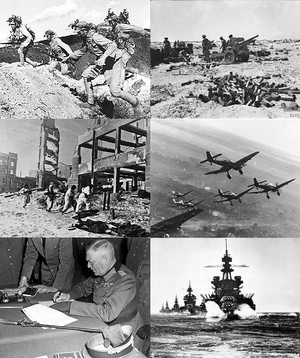
Back Tweede Wêreldoorlog Afrikaans Zweiter Weltkrieg ALS 2ኛው ዓለማዊ ጦርነት Amharic Segunda Guerra Mundial AN Ōðru Woruldgūþ ANG الحرب العالمية الثانية Arabic لحرب لعالمية الجاوجة ARY الحرب العالميه التانيه ARZ দ্বিতীয় বিশ্বযুদ্ধ Assamese Segunda Guerra Mundial AST
World War II (WWII), or the Second World War, was a global war involving all continents of the world, except the Polar continents. It involved fighting in most of the world from 1939 to 1945. Some fighting started in 1937, when Imperial Japanese forces started the Second Sino-Japanese War. Most of the world's countries, including all of the great powers, fought as part of two military alliances: the Allied Powers and the Axis Powers.
The war involved more countries, cost more money, involved more people, and killed more people than any other war; 73 million people died,[1][2] most of whom were civilians. The war included massacres, a genocide called the Holocaust, strategic bombing, starvation, and disease. This was the only time a nuclear weapon was used in the history of warfare.
The two sides were the Allies (at first China, Free France and the United Kingdom, joined by the Soviet Union, United States and others) and the Axis (at first Nazi Germany, Kingdom of Italy, Vichy France, and Empire of Japan and others).
The war in Asia began when Japan invaded China on July 7, 1937.[3] Actual combat in Europe began when The Third Reich of Germany invaded Poland on September 1, 1939. France and the United Kingdom reacted by declaring war on Germany. By 1941, most of Europe was under German control, including France, Norway, Austria, Hungary, Denmark, Czechslovakia, and Poland. Only the British remained fighting against the Axis in north africa, the Mediterranean, and the Atlantic. Germany gave up plans to invade Britain after losing an airplane battle, the Battle of Britain. In June 1941, Germany invaded the Soviet Union, starting the largest area of war in history. On December 7, 1941, Japan attacked the United States at Pearl Harbor and invaded British and French colonies in Asia, and the two wars became one; The Western Theatre and the Pacific Theatre.
The Japanese victories were stopped in 1942, and the Soviets won the huge Battle of Stalingrad in 1943. Then, the Allies started to win in all areas. The Axis were forced back from the Soviet Union, weakening in the Scorched Earth tactic, whereas the Soviets burned all the food and shelter in the Axis's way, and the Russian winter, which freezed the invading troops, as they weren't prepared for extreme cold: the leaders were not expecting the invasion to last till this season of the year. The Axis also lost north africa, and in a battle in Tunisia, where they were encircled by the Allies. Starting in 1943, were forced to defend Italy. Allied forces had a hard time pushing into Italy from the Southern Island of Sicily due to its vast defensive system.[4] But Operation Mincemeat greatly helped the strategic offensive. In 1944, the Allies invaded France. The invasion was called D-Day, held in June 6th, 1944. They came into Germany itself from the West, while the Soviets came in from the East. Germany surrendered on May 8, 1945.
Japan formally surrendered on September 2, 1945, after the Soviets beat the Japanese in Manchuria and a nuclear bomb had been dropped on Nagasaki and Hiroshima. This was the only time a nuclear weapon has been used in a real war. And until now, or at least for the 21st century, Japan was the only country bombed by a nuke by its enemies.
After the war, the United Nations was set up to develop support between countries and to prevent future wars. After World War 1, the League of Nations had been built, but it proved ineffective when a very ambitious group forms, like the Nazis, which caused World War 2. The Cold War by the major winners soon started, but they did not fight each other in an actual war. The decolonization of Asia and Africa (where many places controlled by European countries were given their independence) happened as well since Europe had been weakened by the war. Economic recovery and political integration (the process of uniting countries) were among other results of the war.
Cite error: There are <ref group=lower-alpha> tags or {{efn}} templates on this page, but the references will not show without a {{reflist|group=lower-alpha}} template or {{notelist}} template (see the help page).
- ↑ Cite error: The named reference
deadwas used but no text was provided for refs named (see the help page). - ↑ Cite error: The named reference
The Second World War1was used but no text was provided for refs named (see the help page). - ↑ Cite error: The named reference
Holocaust Encyclopediawas used but no text was provided for refs named (see the help page).
© MMXXIII Rich X Search. We shall prevail. All rights reserved. Rich X Search
